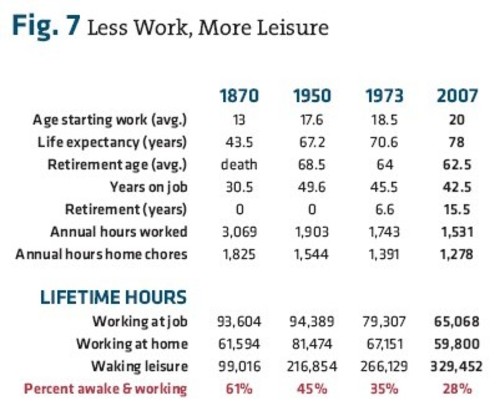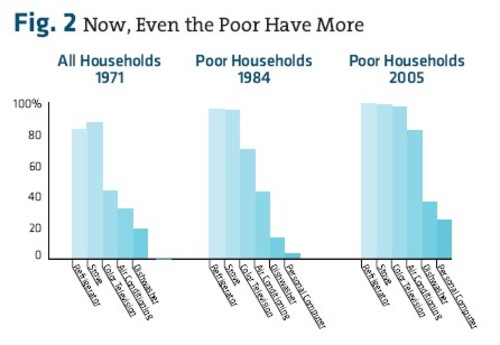Keeping Some Perspective
If past presidential elections are any guide, by the time this one is over, it will have been said that this economy is the worst economy since the Great Depression. W. Michael Cox and Richard Alm of the Dallas Fed write a fabulous article in the American putting current US economic conditions in historic context:
When a presidential election year collides
with iffy economic times, the public's view of the U.S. economy turns
gloomy. Perspective shrinks in favor of short-term assessments that
focus on such unpleasant realities as falling job counts, sluggish GDP
growth, uncertain incomes, rising oil and food prices, subprime
mortgage woes, and wobbly financial markets.Taken together, it's enough to shake our
faith in American progress. The best path to reviving that faith lies
in gaining some perspective"” getting out of the short-term rut, casting
off the blinders that focus us on what will turn out to be mere
footnotes in a longer-term march of progress. Once we do that, we see
the U.S. economy, a $14 trillion behemoth, is doing quite well, thank you very much.
I can't really excerpt the article and do it justice, but suffice it to say that you won't see much of this in any Obama speeches this year. Here are two charts from the article I particularly liked:
Of course, the rejoinder will be, but what about the poor? Well...
Go read it all in advance of the campaign season.


While I agree that the U.S., Canada, and maybe Brazil will be the very best advanced major-nation places to live for the foreseeable future*, it should be noted that by the end of 2009, these may very well actually be the hardest economic times since the Great Depression, and certainly since the 70s.
* Beating the UK and all of Western Europe for a combination of demographic/social spending reasons, Russia for a combination of demographic/oppressed politics/re-emerging ambitions of military grandeur reasons, Japan for demographic/xenophobic reasons, China due to their potential for civil war/gender demographics, and India because they still have a long way yet to go, before they'll be at par with No. America/Western Europe.
The "years on job" figure is wrong, especially for 1870. Life expectancy in those days was strongly affected by high infant and child mortality. Those who lived long enough to start working would have averaged significantly more than 30 years on the job.
I agree that we are doing better absolutely, but many people pay attention to relative "progress" (I am not one of them) after GDP crosses $10,000/capita. Even a slowdown in growth (of consumption, houseprices, etc.) can be depressing for people used to living at a record pace. These effects will get stronger IF something serious is done about global warming (e.g. carbon tax). These nuances will not keep candidates from using these statistics to bash each other.
If we quit importing relatively unskilled, lower wage earners, we would have less poverty. By definition.
Where else but in USA could those in poverty be facing obesity problems? The rest of the world should be so lucky.
tom
an interesting statistic to take out of this is the change in "years of retirement":
consider:
social security and medicare were put into place when the average years of retirement was ZERO.
so it was an easy budget item to balance then. lots of workers, few retirees.
by 1973, years of retirement climbs to 6.6. this is a big deal. then it more than doubles again to 15.5 in 2007.
these programs now encompass a lot more people for a much longer period than was ever envisioned at their inception. they are now 35% and climbing of the federal budget.
i don't have the figures in front of me but i am willing to go out on a limb and say that "health care is not getting any cheaper per capita" either.
I know there are a lot of healthier older people and I see them everywhere at the health club and walking around town. But there are also a lot of unhealthy old people serving out their "leisure" years and I see them everywhere in wheel chairs and with oxygen canisters. My point here is that increased leisure time is not a good measure of 'progress' for a large - or what seems to be large - portion of the population but maybe just an artifact of technological progress; i.e. the life lengthening industry. Now I'm not going 'Kevorkian' or anything like that but there is a bit of an irony in factoring in economic output centered on keeping people alive but unhealthy and calling it "progress". Could this be another expression of Libertarian philosophy simply because there are some macroeconomic po